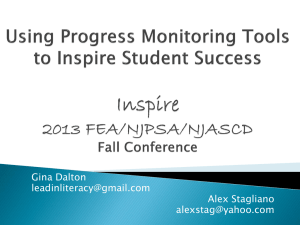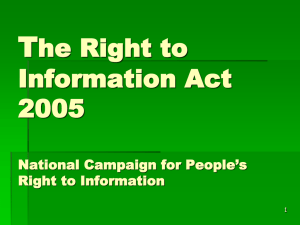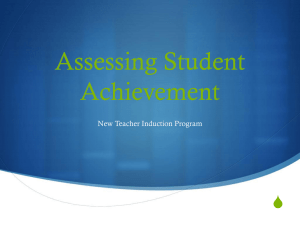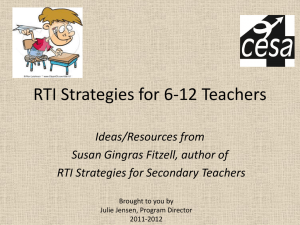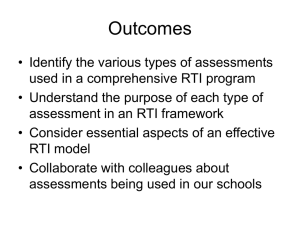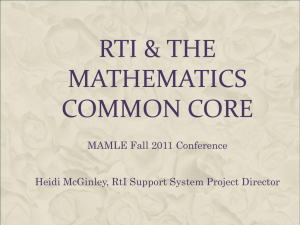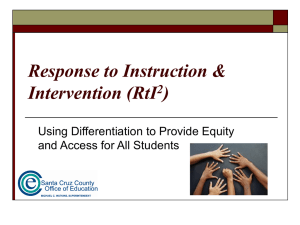Supporting_and_Engaging_Families
advertisement
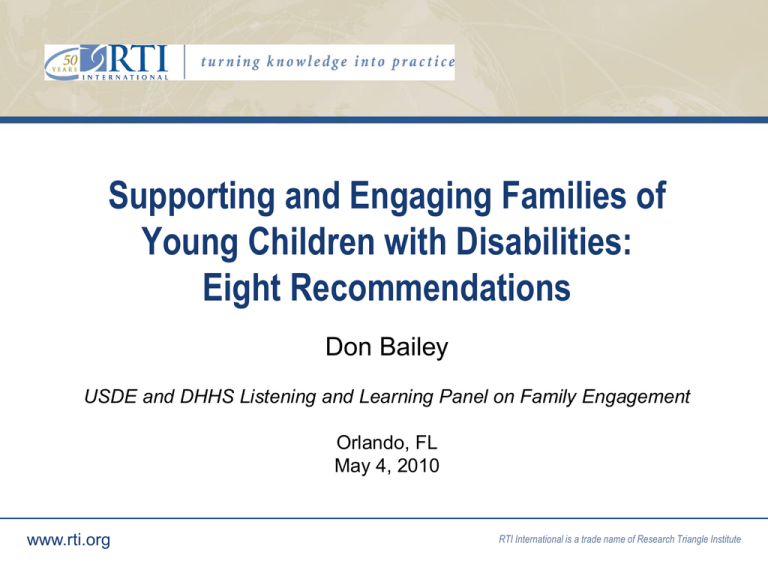
Supporting and Engaging Families of Young Children with Disabilities: Eight Recommendations Don Bailey USDE and DHHS Listening and Learning Panel on Family Engagement Orlando, FL May 4, 2010 www.rti.org RTI International is a trade name of Research Triangle Institute Family adaptation • Having a child with a disability forces families to make alterations and accommodations in almost every aspect of life • A primary goal of early learning programs ought to be helping parents successfully adapt • We can help families adapt by – Using family-centered principles as the foundation for all that we do – Engaging in specific practices designed to promote desired family outcomes – Expecting programs to demonstrate benefit for families www.rti.org Programs serving young children should lead to improved outcomes for both children and families Family Needs Concerns Child Developmental Status Early Intervention Child-Focused Services Child Outcomes Functional Abilities Disability Type Learning Style Resources Priorities Goals www.rti.org Family-Focused Services Family Outcomes Embedding family-centered principles in program activities can lead to improved family outcomes Family-Centered Principles Shared philosophy Families as partners Focus on strengths Family choice of goals and services Collaboration and coordination of service Effective communication Flexibility Community-based Program Activities www.rti.org Referral and intake Determining eligibility Child assessment Family assessment Team meetings and decision-making Service provision and coordination Parenting practices Community support Family Outcomes Understand child’s abilities and special needs Know rights and advocate effectively Help child develop and learn Have support systems Access the community Example: Key questions about involving families in child assessments • Do we try to determine family preferences about the purpose and format of child assessment, as well as their wish to be involved? • Does the family’s perception of child needs and family routines determine the focus of assessment? • Do we listen to family preferences in determining settings, times, and parent roles in child assessment? • Do we address children’s strengths in the assessment process? • Do we accept and use parents’ reports of their children’s abilities? • Do we convey assessment information in a sensitive and jargon-free fashion? www.rti.org RECOMMENDATION 1 Identify and implement strategies to support families who are wondering if their child’s development or behavior is progressing as expected. • Problem: Families often experience delays and frustrations in validating concerns • Goal: Enable earlier entry into early intervention 6 www.rti.org 4/9/2015 Patterns of early identification (Bailey et al., Pediatrics, 2004) www.rti.org Identifying children with fragile X (Bailey et al., Pediatrics, 2009) 45 40 35 Months 30 First concern 25 Delay confirmed 20 Services began Diagnosed with FXS 15 10 5 0 2001 2002 2003 2004 2005 2006 2007 (n=26) (n=22) (n=48) (n=39) (n=28) (n=28) (n=22) Year of Diagnosis www.rti.org RECOMMENDATION 2 Ask state early intervention programs (0-3 years) to report outcomes experienced by families of children with disabilities • Problem: Currently states are only expected to report on perceived helpfulness of EI • Goal: Emphasize that benefit to families is as important as benefit to children. 9 www.rti.org 4/9/2015 A family outcome is different from a family’s perceptions of services • My family was given information about our rights • The information we received about family rights was understandable • The information we received from Early Intervention helped us understand our rights • We know our rights and what to do if we are not satisfied. www.rti.org Recommended Family Outcomes (ECO Center, Bailey et al., 2006) • • • • • www.rti.org Families know their rights and advocate effectively for their child. Families understand their child's abilities and special needs Families help their child develop and learn. Families have the supports they want. Families participate in desired services and activities that are available to all families in their community. ECO Family Outcomes and OSEP APR Requirements [Part C] ECO OSEP • Understand their child’s strengths, • Percent of families abilities, and special needs participating in Part C who report that EI services have • Know their rights and advocate helped the family effectively for their children – Know their rights • Help their children develop and learn – Effectively communicate their children’s needs • Have support systems – Help their children • Access desired services, develop and learn programs, activities in their community www.rti.org RECOMMENDATION 3 Expand the vision of preschool programs to promote family outcomes. • Problem: Preschool programs are less likely than infant-toddler programs to embrace family services, and outcomes are not required to be reported • Goal: Assure continuity of family-centered principles, practices and results, birth through kindergarten (and hopefully beyond!) 13 www.rti.org 4/9/2015 APR Requirements for Part B, Section 619 Preschool Programs • % of parents who report that schools facilitated parent involvement as a means of improving services and results for children with disabilities • no specific indicator for preschool, nor the expectation for examining preschool family involvement separately from Part B (schoolaged children) www.rti.org Recommended Head Start (HS) Program Performance Measures (ACYF, 1998) • Objective 2: Strengthen families as primary nurturers of their children – Demonstrate improve parenting skills – Improve their self-concept and emotional well-being – Make progress toward educational, literacy, and employment goals • Objective 4: Link children and families to needed community services – – – – With social service agencies to obtain needed services With educational agencies to obtain needed services With health care services to obtain needed care Secure child care in order to work, go to school, or gain employment www.rti.org RECOMMENDATION 4 Support the development and evaluation of personnel development and TA to improved capacity for engaging and supporting families. • Problem: Professionals receive comparatively little training in how to work with families, and programs often segment family services rather than integrated across all activities. • Goal: Professionals understand the importance of family-centered practices and implement them consistently. 16 www.rti.org 4/9/2015 RECOMMENDATION 5 Support research on families, especially for families of children with disabilities • Problem: Almost all research programs in IES and Head Start emphasize or restrict funding to childfocused research. • Goal: Identify evidence-based practices most likely to promote family engagement and adaptation. 17 www.rti.org 4/9/2015 RECOMMENDATION 6 Create a national data coordinating center on family outcomes and factors related to outcome attainment. • Problem: States collect and report data, but no mechanism exists to integrate or use these data. • Goal: Use national data and assist states to use their own data to answer important questions about factors associated with variability in family outcomes. 18 www.rti.org 4/9/2015 RECOMMENDATION 7 Conduct a national study of the status of parent involvement and family support programs • Problem: Extraordinary variability exists in family support programs, and little is known about the relative costs and benefits of each • Goal: Determine the cost, quality, and outcomes of parent involvement and family support programs. 19 www.rti.org 4/9/2015 RECOMMENDATION 8 Convene a national summit to reach crossagency consensus on the goals and outcomes of programs serving families with young children. • Problem: Agencies vary in nature and extent of expectations for family involvement and family outcomes • Goal: A unified commitment to supporting family well-being and adaptation 20 www.rti.org 4/9/2015
